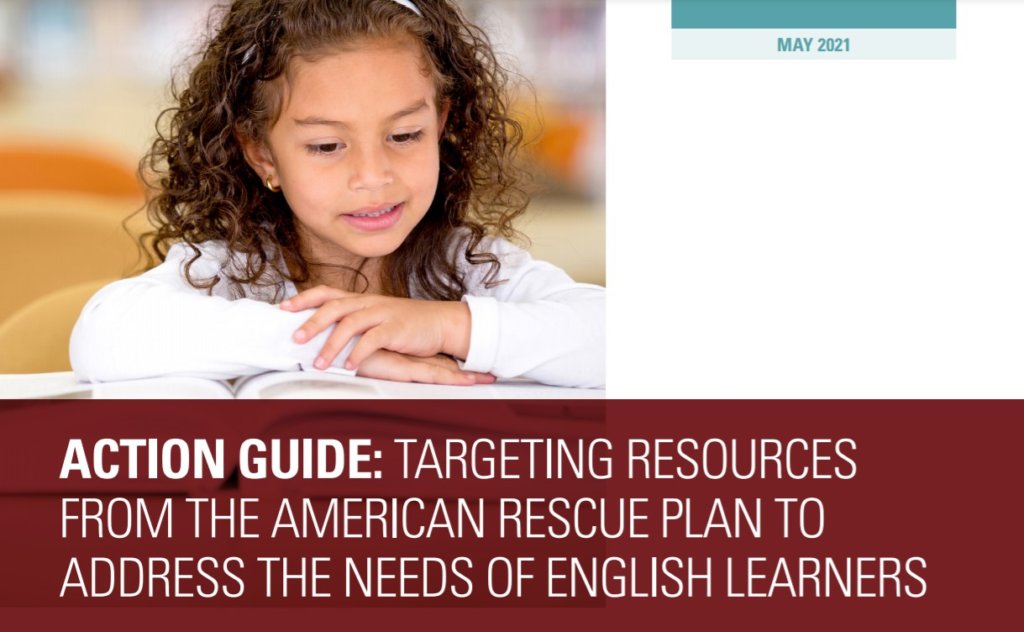UnidosUS Education Team Looks at What the Confirmation of U.S. Education Secretary Miguel Cardona Could Mean for Civil Rights
Following a lengthy hearing last month discussing concerns about longstanding opportunity gaps in the U.S. education system, the exacerbation of learning challenges brought on by the pandemic, issues surrounding academic assessments and reopening schools, and a heated debate about student gender identity and equality, the Senate officially confirmed Miguel Cardona as Secretary of the U.S. Department of Education on Monday.
“I will work tirelessly to ensure our education system is a door to opportunity, a great equalizer for every student,” Cardona said during the Senate HELP Committee hearing, throughout which he drew from his own experiences as an English learner (EL), a Latino, and a longtime educator, and pledged to provide all students a safe, inclusive, affordable, and modern approach to learning.
“Dr. Miguel Cardona’s confirmation today by a 64 to 33 vote to lead President Biden’s Department of Education is a win for students, educators and our country. As our education system grapples with new challenges such as remote learning brought about by the pandemic in addition to long-standing systemic inequities, we need a leader at the helm with his talent and expertise to help chart a path forward. Connecticut Commissioner of Education Cardona is an educator who knows, values and has experienced the public school system, and we have no doubt that his leadership will help usher in a more just and equitable educational response for every student in America,” UnidosUS President and CEO Janet Murguía said in a statement.
Assessments, School Reopening, and Vaccinations
During Cardona’s confirmation hearing, Senator Patty Murray (D-WA), the new Chair of the Senate Health, Education, Labor, and Pensions Committee, opened the event by noting that the pandemic has set back learning by one to three months for White students and three to five months for students of color.
“Our students and our schools are in crisis, and every day without an experienced leader at the Department of Education is a day we are losing precious ground,” she noted.
For UnidosUS, a key issue is annual testing for academic achievement and language assessments for ELs. The U.S. Department of Education understandably waived annual assessments in Spring 2020 for all 50 states for the 2019-2020 school year given the tumultuous switch to distance learning at the outset of the pandemic.
“Since that time, school communities have had to adapt to continue to provide instruction to students, and we know that many Latino students and English Learners have struggled, but we do not know the extent to which they have experienced learning loss,” UnidosUS Director of Education Policy Amalia Chamorro told ProgressReport.co, adding that. UnidosUS supports resuming annual assessments this year “because it is critical that the education system measure and report data on how COVID has impacted student learning during the pandemic. Annual assessments provide a powerful tool in understanding where students stand on their path to success and to better target policies and funding to address education recovery for the students with the greatest needs.”
Senator Richard Burr (R–NC) raised this same issue to Cardona by asking him what he thought about waivers.
“I don’t think we need to be bringing students in just to test them on a standardized test. I don’t think that it makes any sense,” Cardona responded, but noted, “if we don’t assess where our students are and their level of performance, it’s going to be difficult for us to provide some targeted support and a resource allocation in the manner that can best support the closing of gaps that have been exacerbated due to this pandemic.”
“We agree with Dr. Cardona that schools should not have students who are learning at home take these tests in-person without ensuring their health and safety, while acknowledging the need to conduct assessments. We therefore support guidance from the U.S. Department of Education regarding states’ flexibility to determine how and when to administer assessments,” Chamorro said.
Last week, the U.S. Department of Education issued its much-anticipated guidance on annual assessments, making clear that it will not be inviting states to request blanket waivers on the administration of the tests, but will provide for flexibilities and waivers on how these tests are used for accountability purposes during the 2021-2022 school year. UnidosUS joined more than 40 civil rights and education advocacy partners in a statement supporting the Department’s decision not to provide a blanket waiver.
Chamorro added, “We also know that it is vital that we do everything possible to get students back to the classroom, and this will take clear guidance and necessary resources from the federal government, as well as building trust from students, parents and educators that schools can safely reopen. This includes prioritizing teachers and school staff for vaccinations,.” Chamorro said.
Cardona drew upon his recent role as Connecticut’s education commissioner during the pandemic to explore best practices in ensuring schools can reopen with the right safety measures in place.
“Some of the strategies that we took in Connecticut that were very clear were to make sure that we relied very closely on the science. We partnered with our public health experts in the state, and created a system of communication that was regular and intentional,” he told the Senate HELP Committee. “We were open and transparent with what we knew, and we made sure that we partnered with our health experts to put out very clear guidance early on, to make sure that the mitigation strategies were very clear, to make sure that we talked about how to safely reopen schools and how to provide the students the access to learning if they had to learn remotely. We partnered together.”
Higher Education
All of these issues drastically impact students’ ability to prepare for and enroll in college to get the degrees they need for a highly skilled workforce, say UnidosUS education experts. And while Latino enrollment in college was increasing before the pandemic, so too was the number of Latinos leaving institutions of higher learning before obtaining their degrees. Cardona pledged to address each one of them.
“We will work to reopen schools safely so that students can return to classrooms. We will remove silos in education, sharing our breakthroughs and successes throughout the country, and cultivating schools and colleges as places of innovation,” Cardona told the Senate. “We will make sure that when students graduate from high school, they have college and career pathways to good futures. We will make sure we make college accessible to every student who seeks opportunity through education, including strengthening this nation’s best kept secret: community colleges.”
“UnidosUS looks forward to working with Secretary Cardona to strengthen and invest in community colleges, as nearly half of Latinos enrolled in postsecondary education attend public two-year colleges,” said Chamorro.
While many consider these institutions more affordable than four-year colleges and universities, between 2000 and 2016, the cost of two-year public colleges increased by 48%.
“Not only do community colleges play a key role in preparing our workforce, they also serve as a gateway for individuals to obtain advanced degrees, to become teachers, scientists, and engineers, all careers that will be crucial to recovering from this pandemic.”
LGBTQ Rights
One of the most heated moments of the hearing came when Senator Rand Paul (R-KY), grilled Cardona on his views about transgender students competing in female sports. The senator suggested that the U.S. Department of Education Office of Civil Rights was of the opinion that schools shouldn’t be “forced to allow boys to compete in girls’ sports,” then he asked, “does it bother you that like the top 20% of boys running in track meets beat all the girls?”
In 2017, then Education Secretary Betsy DeVos rescinded a series of Obama-era policies that explicitly added protections for transgender students under Title IX of the Higher Education Act. That set of civil rights-era laws prohibits discrimination on the basis of gender, and Obama’s guidance then guaranteed transgender students access to sex-segregated activities according to their gender identity. On January 7, 2021, under DeVos’ leadership, the Department of Education issued a memo saying that LGBTQ students were not covered under Title IX. That same day, exactly one day after the assault on the U.S. Capitol, she quit her job.
“I have, as Commissioner of Education, had conversations with families who have felt the way you just described it, and families of students who are transgender, so I understand that this is a challenge,” Cardona responded. But when he said he looked forward to working with Paul and others, the senator cut him off.
“Do you think it’s fair to have boys running in the girls’ track meet?” Paul asked.
“I think it’s the legal responsibility of schools to provide opportunities for students to participate in activities, and this includes students who are transgender,” Cardona responded.
The tense discussion ended with Paul telling Cardona he was disappointed in the answer, and that Paul and “most people in the country” think it’s “bizarre” that someone who thinks like that would run the U.S. Department of Education.
At the center of our work is the priority to support Latinx students across the United States. This includes enhancing the visibility, voice, talents, stories and opportunities of lesbian, gay, bisexual, transgender, and queer youth,” UnidosUS Education Policy Analyst Tania Valencia told ProgressReport.co. “We are committed to supporting LGBTQ Latinxs to live authentically and ensure that they are fully welcomed within their communities and in our nation’s schools,.”
Amid all these concerns, Cardona said he wanted to acknowledge what he called a historic level of resilience among students.
“Our students have really risen to the occasion and really adapted in ways that are inspiring to me as an educator and a father,” he said, but to give them the strength to keep going, he said policymakers and educators must “identify those practices that we know are effective at meeting students where they are.”
“I was struck by his choice to frame students as resilient and rising to the occasion, this insight showcases how much Cardona understands the power of students. We do our best in the education policy team to showcase that Latino students are resilient and there is evidence for it,” said UnidosUS Education Policy Analyst Amanda Martinez.
A New Era in Education
“Under the Trump administration, tests and PPE were hard to get. Federal guidance was politically motivated and unclear. And the path to safely reopening schools in-person was chaotic and uncertain,” Senator Murray, said during Cardona’s confirmation hearing. “Families are now counting on us to get things on track fast.”
Senator Tina Smith, D-MN, is counting on Cardona to usher in a new era for students who may be immigrants and/or English learners. She noted that there are some five million schoolchildren who do not speak English as their home language.
“Certainly learning English as a second or third language is complicated and is challenging, but I think so much about what an opportunity this is and, how much this adds to our classrooms and our schools and the experiences of all children,” she told Cardona. “How could you build on that as we go forward?”
Cardona, who was born in Puerto Rico to Spanish speaking parents said he whole heartedly agreed. “Not only should we be encouraging having more than one language, bilingualism, but also we should be acknowledging not only bilingualism but biculturalism. I think, you know, they go together and that we honor our students’ bilingualism by also honoring their culture.”
In learning of Cardona’s confirmation, Murguía reaffirmed those concerns, as well as her excitement over a Latino Secretary of Education to represent an increasingly diverse student population.
“And after four years of neglect and indifference, our nation needs an education secretary with not only the heart and experience to champion the needs of disadvantaged students, but the necessary qualifications to meaningfully address growing educational disparities. A longtime educator and administrator, Cardona has shown a deep commitment to driving educational equity by working tirelessly to close achievement gaps and serve as a strong advocate for English learners. Today we turn the page and welcome an education secretary who will fight for high-quality, equitable education for all,” Murguía said.




